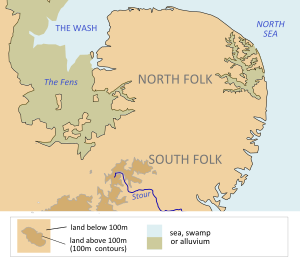Wuffingas

The Wuffingas, Uffingas or Wiffings were the ruling dynasty of
The last of the Wuffingas kings was Ælfwald, who died in 749; he was succeeded by kings whose lineage is unknown.
Earliest kings of the East Angles
The
The earliest kings of East Anglia were known as the Wuffingas, named after the semi-historical founder of the dynasty, Wuffa. Rædwald (died c. 625) is the first of the country's kings known to have ruled. Bede identified Rædwald's father as Tytil and his grandfather as Wuffa; their respective accession dates of 571 and 578 were given by the 13th century English chronicler Roger of Wendover. The Historia Brittonum lists Wehha, father of Wuffa as the first of the Wuffingas, which perhaps sets the date for the origins of the dynasty to the middle of the 6th century.[2]
Wuffa is thought to mean "little wolf", suggesting that the dynastic name Wuffingas translates as "kin of the wolf", making it etymologically the same as the Wulfings clan named in Beowulf and the Old English poem "Widsith".[3]
Dynasty
The following family tree includes the Wuffingas kings from Wehha to Ælfwald. They are numbered in order of ruling.[4] Ecgric was also a member of the Wuffingas house, but his exact descent is not decided. He may have been Sigeberht's brother, or his step-brother.[citation needed]
| Wuffingas Family Tree | |||||||||||||||||||||||||||||||||||||||||||||||||||||||||||||||||||||||||||||||||||||||||||||||||||||||||||||||||||||||||||||||||||||||||||||||||||||||||||||||||||||||||||||||||||||||||||||||||||||||||||||||||||||||||||||||||||||||||||||||||||||||||||||||||||||||||||||||||||||||||||||||||||||||||||||||||||||||||||||||||||||||||||||||||||||||||||||||||||||||||||||||||||||||||||||||||||||||||||||||||||||||||||||||||||||||||||||||||||||||||||||||||||||||||||||||||||||||||||||||||||||||||||||||||||||||||||||||||||||||||||||||||||||||||||||||||||||||||||||||||||||||||||||||||||||||||||||||||||||||||||||||||||||||||||||||||||||||||||||||||||||||||||||||||||||||||||||||||||||||||||||||||||||||||||||||||||||||||||||||||||||||||||||||||||||||||||||||||||
|---|---|---|---|---|---|---|---|---|---|---|---|---|---|---|---|---|---|---|---|---|---|---|---|---|---|---|---|---|---|---|---|---|---|---|---|---|---|---|---|---|---|---|---|---|---|---|---|---|---|---|---|---|---|---|---|---|---|---|---|---|---|---|---|---|---|---|---|---|---|---|---|---|---|---|---|---|---|---|---|---|---|---|---|---|---|---|---|---|---|---|---|---|---|---|---|---|---|---|---|---|---|---|---|---|---|---|---|---|---|---|---|---|---|---|---|---|---|---|---|---|---|---|---|---|---|---|---|---|---|---|---|---|---|---|---|---|---|---|---|---|---|---|---|---|---|---|---|---|---|---|---|---|---|---|---|---|---|---|---|---|---|---|---|---|---|---|---|---|---|---|---|---|---|---|---|---|---|---|---|---|---|---|---|---|---|---|---|---|---|---|---|---|---|---|---|---|---|---|---|---|---|---|---|---|---|---|---|---|---|---|---|---|---|---|---|---|---|---|---|---|---|---|---|---|---|---|---|---|---|---|---|---|---|---|---|---|---|---|---|---|---|---|---|---|---|---|---|---|---|---|---|---|---|---|---|---|---|---|---|---|---|---|---|---|---|---|---|---|---|---|---|---|---|---|---|---|---|---|---|---|---|---|---|---|---|---|---|---|---|---|---|---|---|---|---|---|---|---|---|---|---|---|---|---|---|---|---|---|---|---|---|---|---|---|---|---|---|---|---|---|---|---|---|---|---|---|---|---|---|---|---|---|---|---|---|---|---|---|---|---|---|---|---|---|---|---|---|---|---|---|---|---|---|---|---|---|---|---|---|---|---|---|---|---|---|---|---|---|---|---|---|---|---|---|---|---|---|---|---|---|---|---|---|---|---|---|---|---|---|---|---|---|---|---|---|---|---|---|---|---|---|---|---|---|---|---|---|---|---|---|---|---|---|---|---|---|---|---|---|---|---|---|---|---|---|---|---|---|---|---|---|---|---|---|---|---|---|---|---|---|---|---|---|---|---|---|---|---|---|---|---|---|---|---|---|---|---|---|---|---|---|---|---|---|---|---|---|---|---|---|---|---|---|---|---|---|---|---|---|---|---|---|---|---|---|---|---|---|---|---|---|---|---|---|---|---|---|---|---|---|---|---|---|---|---|---|---|---|---|---|---|---|---|---|---|---|---|---|---|---|---|---|---|---|---|---|---|---|---|---|---|---|---|---|---|---|---|---|---|---|---|---|---|---|---|---|---|---|---|---|---|---|---|---|---|---|---|---|---|---|---|---|---|---|---|---|---|---|---|---|---|---|---|---|---|---|---|---|---|---|---|---|---|---|---|---|---|---|---|---|---|---|---|---|---|---|---|---|---|---|---|---|---|---|---|---|---|---|---|---|---|---|---|---|---|---|---|---|---|---|---|---|---|---|---|---|---|---|---|---|---|---|---|---|---|---|---|---|---|---|---|---|---|---|---|---|---|---|---|---|---|---|---|---|---|---|---|---|---|---|---|---|---|---|---|---|---|---|---|---|---|---|---|---|---|---|---|---|---|---|---|---|---|---|---|---|---|---|---|---|---|---|---|---|---|---|---|---|---|---|---|---|---|---|---|---|---|---|---|---|---|---|---|---|---|---|---|---|---|---|---|---|---|---|---|---|---|---|---|---|---|---|---|---|---|---|---|---|---|---|---|---|---|---|---|---|---|---|---|---|---|---|---|---|---|
| |||||||||||||||||||||||||||||||||||||||||||||||||||||||||||||||||||||||||||||||||||||||||||||||||||||||||||||||||||||||||||||||||||||||||||||||||||||||||||||||||||||||||||||||||||||||||||||||||||||||||||||||||||||||||||||||||||||||||||||||||||||||||||||||||||||||||||||||||||||||||||||||||||||||||||||||||||||||||||||||||||||||||||||||||||||||||||||||||||||||||||||||||||||||||||||||||||||||||||||||||||||||||||||||||||||||||||||||||||||||||||||||||||||||||||||||||||||||||||||||||||||||||||||||||||||||||||||||||||||||||||||||||||||||||||||||||||||||||||||||||||||||||||||||||||||||||||||||||||||||||||||||||||||||||||||||||||||||||||||||||||||||||||||||||||||||||||||||||||||||||||||||||||||||||||||||||||||||||||||||||||||||||||||||||||||||||||||||||||

| |
| Ancestor | |
|---|---|
| Ælfwald (Alfwold Aldwulfing) | |
| Ealdwulf (Aldwulf Æðelricing) | |
| Ethelric (Æþelric Ening) | |
| Eni (Eni Tytling) | |
| Tytla (Tytla Wuffing) | |
| Wuffa (Wuffa Wehhing) | |
| Wehha (Wehh Wilhelming) | |
| Wilhelm (Wilhelm Hrypping) | |
| Hryth (Hryp Hroðmunding) | |
| Hrothmund (Hroðmund Trigling) | |
| Trygil (Trygil Tytimaning) | |
| Tytiman (Tytiman Casericg) | |
| Caesar (Caser Wodning) | |
| Wōden (Woden Frealafing) | |
| Pedigree of Ælfwald from the Anglian collection, preserved in the Textus Roffensis | |
After 749, East Anglia was ruled either by the rulers of Mercia, or by kings whose genealogy is not known.
Centres of royal power

The territory between the Orwell and the watersheds of the Alde and Deben rivers may have been an early centre of royal power for the Wuffingas kings, originally centred upon
Cultural associations
The author Sam Newton has claimed that the
References
- ^ Newton 2004, p. 77.
- ^ Yorke 2002, pp. 4, 61.
- ^ Newton 2004, pp. 105–106.
- ISBN 978-0-4151-6639-3.
- ^ West 1998, pp. 261–275.
- ^ Wade 2001.
- ^ West, Scarfe & Cramp 1984.
- ^ Bruce-Mitford 1974, pp. 73–113.
- ^ Newton 2004, pp. 133–134.
Bibliography
- ISBN 978-0-575-01704-7.
- Newton, Sam (2004). The Origins of Beowulf and the Pre-Viking Kingdom of East Anglia. Cambridge: D. S. Brewer. ISBN 978-0-85991-472-7.
- Wade, Keith (2001). "Gipeswic – East Anglia's first economic capital, 600–1066". In Salmon, Neil & Malster, Robert (eds.). Ipswich from the First to the Third Millennium: Papers from an Ipswich Society Symposium. Ipswich: Ipswich Society. pp. 1–6. ISBN 978-0-9507328-1-7.
- West, Stanley E.; Scarfe, Norman & Cramp, Rosemary (1984). "Iken, St Botolph, and the Coming of East Anglian Christianity" (PDF). Proceedings of the Suffolk Institute of Archaeology. XXXV (4). Ipswich: Society of Antiquaries of London: 279–301.
- West, Stanley E. (1998). Aspects of Anglo-Saxon Archaeology: Sutton Hoo and Other Discoveries (PDF). East Anglian Archaeology (Report). Ipswich: Suffolk County Council. ISBN 978-0-86055-246-8.
- ISBN 978-0-415-16639-3.
Further reading
- Johnson, Flint F. (2017). The British Heroic Age: A History, 367-664. Jefferson, North Carolina: McFarland, Incorporated. ISBN 978-07864-9-522-1.
- Pluskowski, Aleksander; Agnarsdóttir, Anna; Ayers, Brian (2015). East Anglia and its North Sea World in the Middle Ages. Woodbridge, UK: ISBN 978-17832-7-036-1.
External links
- Information about the Wuffingas dynasty from Sam Newton
- William of Malmesbury's Chronicle of the Kings of England from the earliest period to the reign of King Stephen, Book 1, "Of the kings of the East Angles" in English and in Latin
